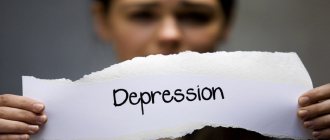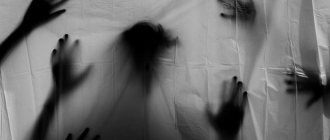Chronic depression is a long-term mental disorder, which, like other types of depression, is manifested to varying degrees by decreased mood, apathy, anxiety, low self-esteem, decreased motor activity, mental and physical retardation, irritable mood, negative thoughts, insomnia, decreased appetite and sexual interest. It makes sense to talk about the chronic course of the disease when symptoms persist for 2 years. Moreover, in more than half of the cases, patients do not arouse suspicion among others, since the symptoms may not be very pronounced, which in turn leads to low referral to specialists, and, as a consequence, to a greater chronicity of the condition, an increased risk of complications and worsening of the course. illness, including the risk of suicide.
Diagnostics
It is necessary to distinguish severe depression from other forms of the disease. Patients suffering from severe depression often experience bouts of crying and sudden weight loss or weight gain. Patients experience fatigue, have an increased need for sleep, and suffer from chronic pain. An increased need for sleep can be a sign of a nervous disorder. A person ceases to show interest in usual affairs, in his family, he becomes aggressive. Patients often experience suicidal thoughts.
A person suffering from deep depression needs to consult a psychiatrist or psychotherapist who will identify the causes of the disease and select the optimal treatment.
Causes of the disease
What can cause severe depression? There is no exact answer here; each case is individual. Sometimes a disorder arises even due to minor difficulties that have settled firmly and for a long time in a person’s life. Lack of money, an unloved job, forced living with unpleasant people, an illness that worsens the quality of life - all these factors can cause stress and depression.
Most often, depressive disorder occurs for reasons of a psychological, physiological or social nature.
Psychological reasons are:
- the presence of bipolar depression (chronic manic disorder associated with seasonal exacerbations);
- frustration (a constant feeling that desires are impossible to fulfill);
- loss of goals, meaninglessness of existence;
- long-term stress;
- psychological trauma;
- death of loved ones;
- violence (both physical and moral);
- tendency to get stuck in experiences associated with complex or unusual events.
Biological reasons may be:
- seasonal factor (for example, autumn or spring);
- neurobiological characteristics of the body;
- immune system disorders;
- abuse of alcohol, tobacco, drugs;
- suffered severe infectious or chronic diseases;
- impaired cerebral circulation;
- poor nutrition;
- poor sleep;
- endocrinological reasons (pregnancy, postpartum period, menopause or disease of the endocrine system);
- overwork, emotional burnout.
The risk of developing severe depression also increases with the participation of the following social factors:
- infidelity or divorce;
- violence in family;
- old age and the associated loss of meaning in life;
- high work loads;
- economic crisis;
- political instability in the country/world;
- loss or change of job.
Most often, depression develops for several reasons at once; all of them must be identified and taken into account in order to prescribe the correct treatment.
Important!
You should not self-medicate, it can harm your health and worsen your psychological condition.
Signs
The following are symptoms of severe depression:
- Sleep disorders: difficulty falling asleep at night, insomnia, waking up in the morning, nightmares;
- Feels tired during the day and performance is significantly reduced;
- Inhibited;
- Weight changes: the patient loses weight, or vice versa, weight gain occurs;
- Decreased libido;
- Hallucinations, delusions;
- Reduced self-esteem;
- The patient feels and behaves insecurely;
- Blames himself and expresses self-deprecating ideas;
- A man sees his future in dark colors and bleakly;
- Having thoughts of suicide
If you notice these symptoms, do not delay - the disease will not go away on its own, contact a specialist.
What causes deep depression?
There are three main reasons:
- psychological. Death or serious illness of loved ones, disasters, wars, long-term care for a seriously ill person, drug addiction or alcoholism in the family, exhausting work without rest, etc.;
- endogenous. Metabolic disorder, accompanied by an imbalance in the content of nervous system mediators in the body - serotonin, dopamine, adrenaline, etc. The result of these disorders is persistent low mood and depression, without external visible reasons for this;
- symptomatic. These reasons are caused by serious illnesses, injuries, incurable ailments, disability, and the use of certain medications.
Treatment of severe depression
It is advisable to begin treatment of severe depression with the weakening and relief of the main symptoms.
The use of antidepressants brings a noticeable improvement in condition and mood. In severe cases, drug treatment in a hospital is necessary. The most effective use of pharmacotherapy is in combination with psychotherapy. Psychotherapy can be carried out in group, individual and family forms.
New treatments such as biofeedback and transcranial magnetic stimulation are also effective for major depression.
In addition to the main treatment, restorative therapy is indicated: walks in nature, massage, etc. The approach to the patient plays a huge role. Patients often show irritation and anger. It is very important that a person with depression receives proper treatment from a doctor.
| | Find out more: How is severe depression treated in a hospital? |
We can help you! Call us
Types of depression in psychiatry
Depression includes a complex of somatic and psychological syndromes. There are several types of this disorder, which differ from each other in the characteristics of their clinical picture.
Classical
A classic depressive episode lasts from several weeks to one year. The complex of classical syndromes affects not only mood, but also performance. A person experiences stiffness of movement, apathy, impaired concentration and even mental functions. After the initial episode, depression may return.
Psychiatric
Any type of depression is a mental disorder. General restorative procedures and occupational therapy, contrary to what some people believe, do not help get rid of long-term oppression! You should contact an experienced psychiatrist.
Moderate
Moderate depression is accompanied by a persistent decrease in mood and performance, but does not include suicidal tendencies. Despite its moderate severity, such a disorder in any case requires professional help.
Heavy
Severe, progressive depression includes the following symptoms:
- Loss of interest in life;
- Lack of self-esteem;
- Unreasonable feelings of guilt;
- Persistent feelings of grief and depression;
- Suicidal thoughts, self-aggressive behavior.
Expressed
Severe depression is accompanied by lethargy, lethargy, and decreased mental function. Outwardly, the person is unkempt, speaks quietly, and has a mournful expression on his face.
Chronic
Depression can become chronic if it is not treated in time. In addition, with somatic diseases such as hypothyroidism, depressive episodes occur periodically.
Acute
During an exacerbation, a person experiences overwhelming sadness. Depression of mood can have a chronic form: it becomes a kind of “norm of life” for a person. During an exacerbation, a person can commit suicidal actions: it is necessary to provide the person with timely psychoneurological assistance.
Atypical
Atypical depression occurs in a hidden form. A person feels depressed, but this does not stop him from joking and laughing; there is a high appetite. It is difficult to determine this type of disorder; it is more common in men.
Recurrent
In recurrent disorder, depressive phases alternate with periods of normal mood. Recurrent depression develops in childhood and periodically manifests itself in adulthood.
Agitated
This type of depression includes low mood and anxiety. In this case, a person feels irrational anxiety, general depression is accompanied by periodic panic attacks. A person develops obsessive phobias and typically expects the worst outcome of any event.
Resistant
An obligatory sign of resistant depression implies the ineffectiveness of pharmacotherapy. Several courses of medication may not provide significant improvement. Antidepressants may have insufficient clinical effect. In this case, the patient must be under the constant supervision of a doctor.
Classification and stages
The disease is classified according to severity, divided into mild, moderate and severe. The latter may be accompanied by psychosis.
In the first and second degrees of severity, the patient’s ability to work is maintained, but the quality of life noticeably deteriorates. In severe cases, characteristic symptoms are clearly expressed: fatigue, bad mood, decreased ability to work, thoughts of suicide.
The disease is divided into three types:
- chronic;
- recurrent (repeating);
- episodic.
A third of patients are susceptible to a chronic form of the disease, in which a person experiences a depressive disorder for 2 or more years.
The causes of depression are divided into three groups:
- Endogenous. A person suffers from manic-depressive psychosis, which occurs rapidly and involves alternating between manic and depressive states. Most often, this disease is hereditary.
- Exogenous. Occurs as a result of exposure to acute or chronic stress.
- Somatogenic. Interrelated with previous diseases, such as heart attack, head injuries, pathologies of an oncological nature, stroke.
Some patients are prone to seasonal disorders. Mostly symptoms of the disease occur in the autumn and last throughout the winter months.
Clinical features
Major depression (in modern psychiatry literature it is also called a major depressive episode) is characterized by the following main clinical manifestations:
- decreased mood (hypotymic syndrome);
- slowness of movements;
- deterioration of cognitive functions (slow reactions, thinking).
And if in a mild form of depressive disorder circadian fluctuations in mood are more often noted (for example, in the morning a person is in a depressed state, and in the evening this general state of health noticeably improves), the severe stage of depression is characterized by a constant feeling of depression and hopelessness. Pay attention to causeless irritability, outright hostility and anger at family members, friends, dissatisfaction and criticism towards both oneself and everyone around.
As a rule, severe depression is accompanied by other symptoms. These include:
- brittle nails, hair loss;
- dull complexion;
- decreased skin turgor, the appearance of wrinkles, especially between the eyebrows, as the patient constantly frowns;
- bradycardia, possible decrease in blood pressure;
- loss of appetite, weight loss;
- in women, menstrual cycle disturbances up to amenorrhea are possible; in men, sexual dysfunction is noted against the background of major depression;
- digestive disorders, frequent constipation.
The person looks very old, the corners of his mouth are downturned, his facial expression is gloomy, his speech is slow and monotonous. The patient becomes silent mid-sentence, answers in monosyllabic sentences, and quickly loses interest in the topic of the conversation.
Classification
In psychiatry, depressive disorders are divided into complex and simple. The latter include:
- melancholic;
- anxious;
- adynamic;
- apathetic;
- dysphoric.
Complex severe depressions are:
- Senestopathic. This variant of the disease is very difficult to diagnose, since the leading place in the clinical picture is occupied by somatovegetative manifestations. First of all, these are painful sensations and discomfort in different parts of the body, and the patient is not able to clearly describe either their nature or their exact location.
- Occurring with delusional syndrome and hallucinosis. During an exacerbation, a state of deep catatonic stupor with complete immobility is possible.
Melancholic syndrome in severe depression
General inhibition is characteristic, and it affects both motor and cognitive functions. When communicating with a specialist, the patient speaks of a feeling of extreme melancholy and hopelessness, and they are so strong that they are felt on a physical level in the form of heaviness and tightness in the chest and abdomen.
Any events that take place are seen exclusively in dark, gloomy tones, further life is seen as completely hopeless and meaningless. A person becomes fixated on past grievances, constantly analyzes his past, and thinks about past mistakes. Sometimes the patient can remain in almost the same position for several hours (and sometimes the whole day), all movements are slowed down. They also note a reluctance to do anything, a lack of interest in what is happening around them. Memory deterioration is possible, which is not associated with brain damage, but with absent-mindedness, inattention and the inability to concentrate on anything.
Alarming form
Usually the patient is in a pathologically excited state, speaks and moves quickly, and the development of delusional syndrome is possible. Psychomotor activity is replaced by retardation with pronounced anxiety, which a person feels on a physical level. Sometimes fear reaches its climax, which manifests itself in a panic attack. This condition is characterized by shortness of breath, derealization-depersonalization syndrome, rapid breathing, and loss of self-control.
Anxiety is closely intertwined with obsessive ideas of self-blame, confidence in one’s own inferiority, which often causes suicidal thoughts.
Anesthetic major depression
Typical signs of mental anesthesia are loss of the ability to react emotionally to the environment. In this case, the symptoms of the actual depressive disorder are either absent or expressed to an insignificant degree. But sometimes, under the “mask” of indifference and apathy, a person hides a feeling of irresistible melancholy, and signs of the disease (adynamia, etc.) appear when he is left alone or thinks that no one sees him.
Adynamic variant of the disease
The symptoms of the disorder are dominated by:
- excessive weakness;
- general malaise, feeling of weakness;
- difficulties in performing any physical work or intellectual tasks, while maintaining motivation for activity.
This variant of severe depression is considered the most favorable in terms of maintaining working capacity and treatment.
Dysphoric form
A typical combination of low mood and dysphoria with irritability, anger, and aggressiveness. At the same time, outbursts of rage are completely unpredictable, and anything can provoke them: innocent remarks, objects, minor events that disrupt the patient’s plans (for example, a slight delay in public transport, a traffic jam, etc.).
An attack of irritation can manifest itself either as overt aggression towards others (threats, gross insults) or as a reluctance to communicate with anyone. Some patients at this moment are overcome by a thirst for vigorous activity; usually all actions are chaotic and meaningless. When the attack ends, the person experiences severe internal tension and a feeling of impending disaster.











